What is IVF with donor eggs?
This is In Vitro Fertilisation treatment (IVF-ICSI) with donor eggs. The embryos that are obtained are deposited into the female’s uterus in order to implant and lead to a pregnancy.
At present, this is the treatment which yields the highest success rates, thus making a viable pregnancy a possibility for women who haven’t been successful in prior treatment cycles using their own eggs.


Egg donor selection
As donation in Spain is always altruistic, our egg donors are caring individuals. Our rigorous donor selection process is the reason why our results with egg donation cycles are excellent.
To be an egg donor, a female must be between the ages of 18 and 30 and pass an exhaustive physical and mental health exam.
Although donation is anonymous, our large number of donors allows us to select the one who best resembles your physical characteristics: race, skin tone, eye colour, hair colour, etc. Additionally, we guarantee maximum similarity and compatibility between donor and recipient.
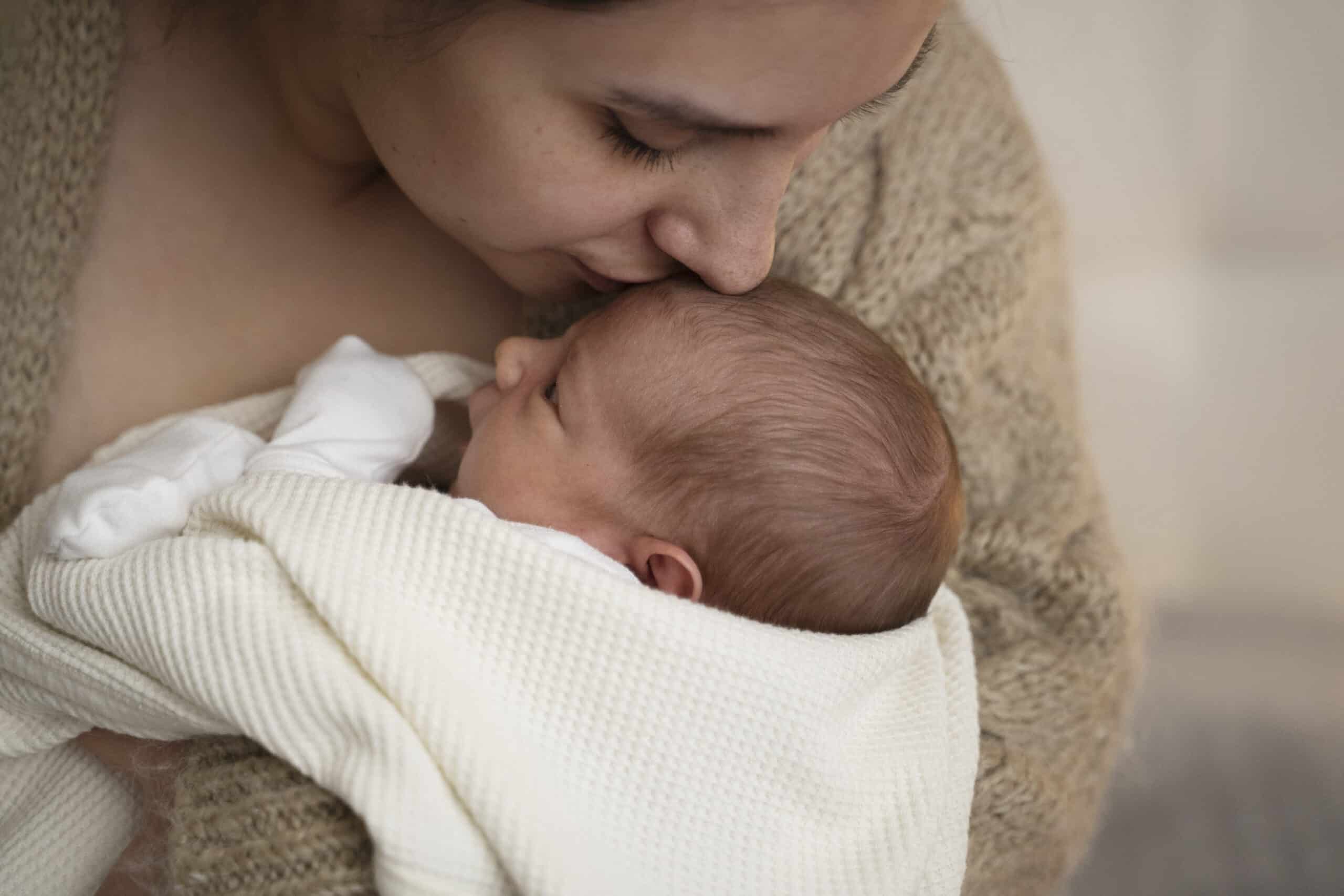
We guarantee your pregnancy until birth or we will give you the money back
Discover Ginemed Maternity, the pregnancy programme that guarantees the birth of your child with your own and donated eggs
Egg donation process
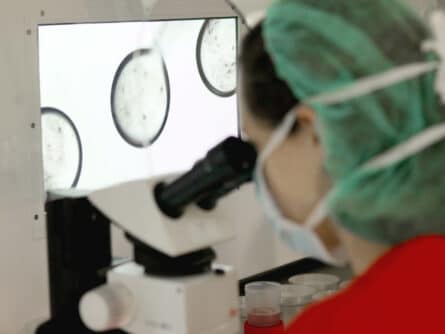
Egg donor treatment
The ovarian stimulation normally begins on the second or third day of the menstrual cycle, and this stage generally lasts 10-12 days until the follicles have reached the ideal size. The egg retrieval is performed vaginally, during which the donor is lightly sedated.
In this case, the donor’s period is synchronised with the recipient’s so that we can prepare your endometrium for embryo transfer while your donor undergoes her treatment.
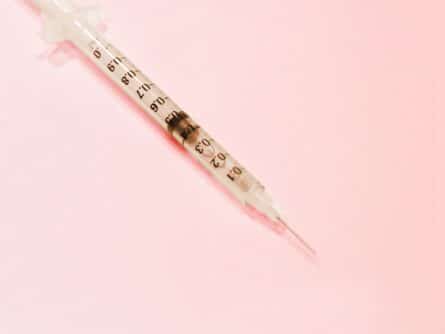
Endometrial preparation for the recipient.
The endometrium is prepared for embryo transfer with the help of oestrogens which you’ll start taking when you get your period. At least two ultrasound scans will be necessary. This stage usually lasts 12-14 days.
The endometrial preparation can be carried out during the recipient’s natural cycle or in a medicated cycle, as both options offer the same success rates.
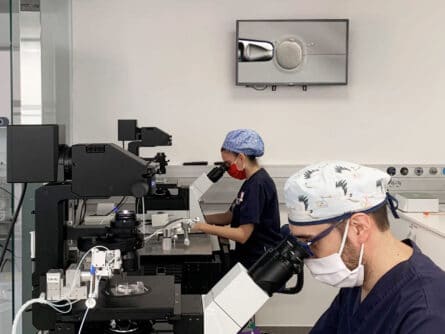
Fertilisation and embryo culture.
Fertilisation is performed using sperm microinjection (ICSI), a technique in which the spermatozoids are injected into the eggs with the help of a microneedle.
Following this process the embryos will remain in the laboratory for a few days until it’s the best time to transfer them. Special laboratory techniques may be used in certain cases to improve results.
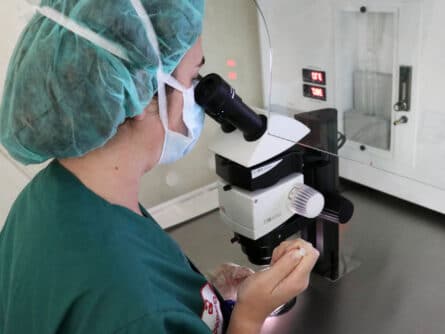
Embryo transfer to the recipient.
The embryo transfer involves depositing the embryos in the uterus using a very thin catheter which is guided through the cervix. The transfer is painless and is normally carried out five days after the egg collection procedure. According to Spanish law, three embryos is the maximum a patient can transfer at a time.
We advise patients to stay relaxed and to take it easy on the day of the embryo transfer and the following day as well. After this the patient can resume her usual day to day activities. We normally prescribe progesterone treatment which the patient will start taking on the day of egg donation. We also recommend taking folic acid.
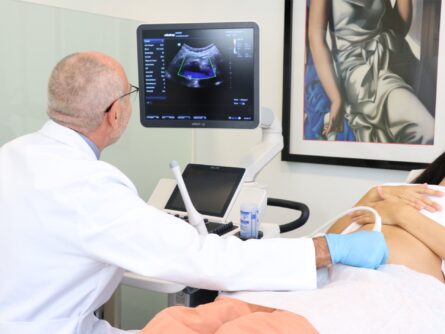
Pregnancy test.
A blood test known as B-HCG (beta) is performed to see if the patient is pregnant about 12 days after the embryo has been transferred. Never stop taking your medication, regardless of your result, until you have first spoken with your gynaecologist and have received instructions concerning the next steps.
The first ultrasound scan will be performed to confirm the type of pregnancy (singleton or multiple), and the presence of a heartbeat about 15 days after the B-HCG analysis.
What will my treatment be like if I don’t live in Spain?
We know that when a woman decides she wants to become a mother she is making one of the most important decisions of her life. Because the desire to be a mother is one that crosses all races, languages and borders, our International Department wants to be by your side when you need it most in order to make your journey as pleasant as possible. Our International Department is made up of native coordinators who will accompany you before, during and after your pregnancy.
We’ll assign you a doctor and a native coordinator
Who will assist you in your native language from the moment you first contact us.
You’ll only need to make one trip to Spain
Which you’ll be able to arrange far enough in advance so that you can book hotels, flights and time off from work. The rest of your appointments can be carried out remotely: by video-call, phone or email.
1st visit is cost-free
If you’d like to meet us in person and undergo all of the preliminary testing with us.
Preliminary testing and ultrasounds during treatment
This can also be done in your country with your gynaecologist. We’ll send you all the necessary instructions.
We’ll adapt to you.
With the necessary resources to get started once you’re ready. No waiting times.
Success rates
At Ginemed our success rates are around 79% for double embryo transfers carried out on Day +5 (blastocyst stage), confirmed by a positive Beta HCG result. The likelihood of achieving a pregnancy doesn’t depend on the recipient’s age, but rather on the number of embryos transferred.
All transfers are performed with Day +5 embryos (blastocyst stage), as success rates are 20% higher than with Day +3 embryos.
Cumulative success rates with egg donation treatment increase with each embryo transfer. By the third embryo transfer, 90% of patients have conceived; it’s not always necessary, however, to undergo more than one embryo transfer in order to achieve a pregnancy.
Pregnancy rates by Beta HCG
1 embryo on Day +5 (Blastocyst)2 embryos on Day +5 (Blastocyst)* Ginemed Results 2020
First fertility visit is free
Request your first appointment cost-free at the clinic closest to you
Frequently asked questions about egg donation
Egg donation is recommended in the following cases:
- Previous failed cycles. When good quality embryos have not been obtained in previous IVF cycles.
- Genetic abnormalities. Women who are carriers of hereditary illnesses that cannot be screened for with the Pre implantation Genetic Test (PGT).
- Ovarian failure. Patients with primary ovarian failure (ovarian insufficiency) or menopause (true and/or premature menopause).
- Advanced maternal age with normal ovarian cycles. As women age their egg quality declines, as do their chances of getting pregnant naturally.
Menopause occurs when the female’s ovaries stop producing oestrogen and progesterone, thus indicating that her ovarian reserve has completely diminished and making it impossible for her to conceive naturally.
Even though the ovaries have stopped functioning, the female’s uterus does not continue aging, meaning it’s able to host embryos and carry a pregnancy to term.
In order for this to be possible, the patient will need to take a hormone treatment prescribed by a gynaecologist -which will vary depending on each female’s particular case-, and the patient must undergo a cycle Egg Donation IVF-ICSI.
Donor selection is a rigorous process that is based on the patient’s physical characteristics so that, even though the eggs are not the recipient’s -genetically, speaking-, it is possible to guarantee maximum donor-recipient resemblance.
On the other hand, it is well known that the interaction between the recipient and the embryo, -maternal epigenetics-, has the potential to modulate the expression of certain genes on the embryo. This could significantly impact the genome of the child and even generate similarities when it comes to certain physical characteristics.
This is in addition to the emotional bond and socio cultural environment in which the baby will be raised, where learned behaviours will be a fundamental part of how the child relates to others and expresses him or herself by imitating what they observe in their family unit.
With both treatment options we can guarantee the security and peace of mind that the best will be selected for the patient.
Embryo adoption is a treatment in which women or couples -who have already completed their family planning project-, decide to donate their embryos which are remaining from a previous treatment cycle.
Results are slightly lower than with egg donation cycles due to the fact that the top quality embryos were transferred in the fresh cycle, so the donated embryos are considered ‘second choice’.
No, in accordance with Spanish legislation all donations must be made anonymously. The law forbids clinics from revealing the donor’s identity to the recipient, and vice versa.
